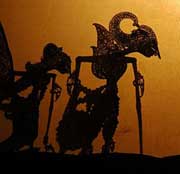|
|
Traveller Tips |
Get in (Visa information)
| Dos and Don'ts |
Culture and Holiday |
Destinations
|
Culture |
 There is no one unified Indonesian culture as
such, but the Hindu culture of the former
Majapahit empire does provide a framework for
the cultural traditions of the central islands
of Sumatra, Java and Bali. Perhaps the most
distinctively "Indonesian" arts are wayang
kulit shadow puppetry, where intricately
detailed cutouts act out scenes from the
Mahabharata and Ramayana, and its
accompaniment the gamelan orchestra, whose
incredibly complex metallic rhythms are the
obligatory backdrop to both religious
ceremonies and traditional entertainment. Some
Malay influences are also common, notably
batik cloth and kris daggers, and Arabic
culture has also been adopted to some degree
thanks to Islam. There is no one unified Indonesian culture as
such, but the Hindu culture of the former
Majapahit empire does provide a framework for
the cultural traditions of the central islands
of Sumatra, Java and Bali. Perhaps the most
distinctively "Indonesian" arts are wayang
kulit shadow puppetry, where intricately
detailed cutouts act out scenes from the
Mahabharata and Ramayana, and its
accompaniment the gamelan orchestra, whose
incredibly complex metallic rhythms are the
obligatory backdrop to both religious
ceremonies and traditional entertainment. Some
Malay influences are also common, notably
batik cloth and kris daggers, and Arabic
culture has also been adopted to some degree
thanks to Islam.
Modern-day Indonesian popular culture is
largely dominated by the largest ethnic group,
the Javanese. Suharto's ban on Western imports
like rock'n'roll, while long since repealed,
led to the development of indigenous forms of
music like dangdut, a sultry form of pop
developed in the 1970s, and the televised
pelvic thrusts of starlet Inul Daratista in
2003 were nearly as controversial as Elvis
once was. Anggun Cipta Sasmi is a talented
Indonesian singer who became a famous singer
in France. Her single "La neige au sahara"
became a top hit on the European charts in the
summer of 1997.
Indonesian literature has yet to make much
headway on the world stage, with torch-bearer
Pramoedya Ananta Toer's works long banned in
his own homeland, but the post-Suharto era has
seen a small boom with Ayu Utami's Saman
breaking both taboos and sales records.
|
|
Holidays |
 Multicultural Indonesia celebrates a vast
range of religious holidays and festivals, but
many are limited to small areas (eg. the Hindu
festivals of Bali). The following covers
public holidays applied nationwide regardless
of their belief. Multicultural Indonesia celebrates a vast
range of religious holidays and festivals, but
many are limited to small areas (eg. the Hindu
festivals of Bali). The following covers
public holidays applied nationwide regardless
of their belief.
The most significant season of the year is the
Muslim fasting month of Ramadhan. During its
30 days, devout Muslims refrain from passing
anything through their lips (food, drink,
smoke) between sunrise and sunset. People get
up early to stuff themselves before sunrise (sahur),
go to work late if at all, and take off early
to get back home in time to break fast (buka
puasa) at sunset. Non-Muslims, as well as
Muslims travelling (musafir), are exempt from
fasting but it is polite to refrain from
eating or drinking in public. Many restaurants
close during the day and those that stay open
maintain a low profile. Bars and other
entertainment places either have their opening
hours cut, stop selling alcohol or even close
entirely. Business travellers will notice that
things move at an even more glacial pace than
usual and, especially towards the end of the
month, many people will take leave.
The climax at the end of the month is the two
days of Idul Fitri (also known as Lebaran),
when pretty much the entire country takes a
week or two off to head back home to visit
family in a ritual is known locally as mudik,
meaning going home. This is the one time of
year when Jakarta has no traffic jams, but the
rest of the country does, with all forms of
transport packed to the gills. All government
offices (including embassies) and many
businesses close for a week or even two, and
traveling around Indonesia is best avoided if
at all possible.
Other Muslim holidays include Idul Adha (the
sacrifice day), Isra Mi'raj Muhammad SAW,
Hijra (Islamic new year) and Maulid Muhammad
SAW. Christian holidays include Christmas,
Ascension Day, Good Friday, while the Hindu
New Year of Nyepi (March-April) bring Bali to
a standstill and Buddhists get a day off for
Waisak (Buddha's birthday), celebrated with
processions around Borobudur. Non-religious
holidays include New Year (1 Jan), Imlek
(Chinese New Year) in Jan-Feb and Independence
Day (17 Aug).
The dates of many holidays are set according
to various lunar calendars and the dates thus
change from year to year. The Ministry of
Labor may change the official date of holidays
if they are close to the weekend. There is
another official day off for workers, called
cuti bersama (taking days off together), which
is sometime close to the Idul Fitri holidays. |
|
|
| |
|